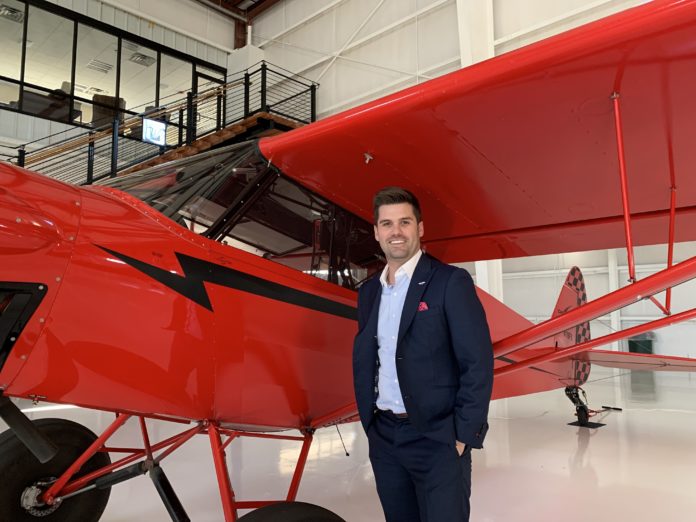
Joe LoRusso is an attorney who practices in a niche within a niche. The aviation lawyer focuses on pilot certificate defense, which he says has a simple underlying purpose. “I allow pilots to be humans, that’s it,” explained LoRusso.
LoRusso and his wife Caitlin run their aviation law practice, LoRusso & LoRusso, Ltd., out of an airplane hangar next to the Rocky Mountain Metropolitan Airport in Broomfield, Colorado. Their office has a glass wall that opens to the hangar, occupied by a black light jet and two matching bush planes. It’s a setting that LoRusso says keeps his passion for flying top of mind when representing clients.
Like many of his clients, flying is an identity to LoRusso. He’s been in a cockpit longer than he’s had his driver’s license and still regularly works as a commercial pilot. “You ask me on the street what I do, I promise you I won’t say attorney first,” LoRusso said.
He explained that his personal passion for flying helps him connect with his certificate defense clients across the country who grapple with a lot more than a job loss. “Not only is their career dependent on their medical [certificate], but that’s also their passion, their love and very honestly their identity.”
LoRusso primarily represents pilots who’ve had their medical certificate questioned or pulled by the Federal Aviation Administration. He says it’s a small field and recalled meeting only 35 other certificate defense attorneys at a national conference several years ago.
Medical clearance on top of a pilot’s license are required for every airman to fly. But, as LoRusso pointed out, a clean bill of health in the eyes of the FAA is more complicated than it might sound.
“Our cases are, if I’m honest with you, no different than a bodily injury car accident case,” LoRussso explained, “We get the medical records, we get experts if we need experts and then we present that all in a demand letter.” The critical difference, said LoRusso, is who the demand letter is sent to. Rather than an insurance company, regulations around issuing special medical certificates mean LoRusso must persuade a presidentially-appointed federal air surgeon.
Those regulations make cases extremely subjective, according to LoRusso. Specifically, the language in 14 C.F.R. 67.401 (a) that stipulates issuing a certificate is “at the discretion of the Federal Air Surgeon” means “that whole legal standard is at the discretion of the federal air surgeon,” LoRusso said. “So we have to be super persuasive in our writing and our medicine to try and persuade them to get the airmen back,” he added.
If the medical clearance is denied by the air surgeon, he explained, pilots can appeal to an administrative law judge appointed by the National Transportation Safety Board. If rejected again, the case moves to the full National Transportation Safety Board then to a federal circuit.
Most cases LoRusso represents are not pilots that are obviously medically unfit to fly, he explained. The FAA has an abundance of caution when it comes to approving medical certificates which creates unique challenges in certificate defense.
He’s seen medical certificates called into question over conditions like sleep apnea, kidney stones, AFIB, heart murmurs and non-aviation DUIs. At the first medical clearance exam, pilots are asked to disclose numerous medical conditions, symptoms and all medications they’ve ever been prescribed. LoRusso said he’s represented clients who’ve been denied medical clearance over decades-old diagnoses or prescriptions including one pilot who was denied clearance after being prescribed Ritalin without a formal diagnosis of ADHD at age nine. The FAA denied the pilot’s medical clearance 23 years later. “We had to take that case and disprove the diagnosis of a nine-year-old from more than two decades ago,” explained LoRusso.
A darker side of medical certificate defense is the effect of FAA standards pilot mental health, said LoRusso. “If a pilot loses a family member, they lose a parent, they’re not allowed to grieve. Because the moment you grieve, you’re experiencing situational anxiety and depression — that’s disqualifying,” explained LoRusso, “you’re not allowed to be a pilot at that point.” He says the regulations can dissuade pilots from seeking medical or psychiatric help.
In some categories, the FAA has different definitions of medical conditions than the medical community. LoRusso explained that he often needs to match clinical with regulatory to make the definitions mesh.
LoRusso believes the FAA should strike a balance between an abundance of caution around medical certificates and a trust in pilots that they would not fly while medically impaired. “There has to be some kind of middle ground in there and I would prefer that it go towards the trust of the pilot,” said LoRusso. “We understand the high level of safety that the public requires and expects of pilots. But at the same time, they can be human too,” he added.
“They can experience stuff, and they can get treated for stuff, and they can ground while they’re getting treatment, but they can come back and they should be allowed to do that,” LoRusso said, “they’re not superhuman.”
Despite the challenges that come with aviation certificate defense, it’s a focus that LoRusso finds rewarding. Representing other pilots keeps him going, he explained. “I’m seeing pilots at their absolute worst who are otherwise tough human beings and are crying on the phone to me because they’ve lost everything,” he added, “without that, there’s no way I would do this.”

